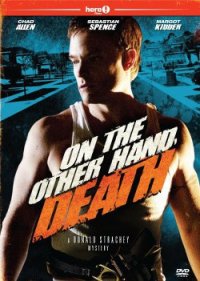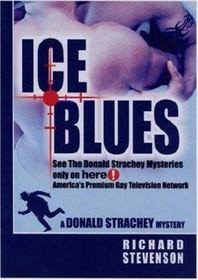Strachey's Folly - Stevenson Richard (читать книги онлайн регистрации .TXT) 📗
"I am. I'm doing the novel and the screenplay simultaneously."
"You're quite efficient."
"Yeah, I am. Even though I don't have to be. I've got nothing but time on my hands down here."
Fools rush in. "What's the novel about?"
Suter smiled ruefully. "It's about an exceptionally charming and attractive man with intimacy issues. Sound familiar? I confess. The novel is autobiographical."
"Oh, well. 'Intimacy issues.' I'm glad to hear you're writer enough to tackle one of the great literary themes."
"You're ridiculing me."
"You bet."
"Why? Why should you make fun of me?"
"Because you talk about yourself in vague, psychobabbly euphemisms. You don't have 'issues,' Suter. You have a history of playing with gay men cruelly. What it is, is acting like a total asshole. In fact, there's a title for you: The Autobiography of an Asshole."
Suter stared at the blackening sunset and said nothing.
"I feel sorry for you," I said, "because for whatever reason, you can't seem to help yourself. You do have some shallow understanding of your weaknesses and their cruel effect on others. But some critical part of what ought to be your moral ballast is missing, so you minimize what you do to people. You call it 'issues,' when it's actually psychological sadism. I'm sorry that you're deluded, and I'm sorry that you met a man who apparently is even more sadistic than you are. I think you deserve to be socked in the jaw, figuratively or actually. But I don't believe you deserve a lifetime of Jorge. He sounds grotesque."
Suter lay very still on his chaise through this. Then he said, without much emotion, "It won't be a long lifetime, however. My looks will soon fade, and Jorge will lose interest. He'll find another, younger, beautiful slave. His mother will die, I'll lose my protector, and then I'll be killed."
I thought of Timmy back in Washington and his conviction that Maynard's shooting was one of the events flowing from a vast and terrible conspiracy, and then I thought of my own belief that surely all these gruesome events flowed instead from more mundane examples of human weakness and folly, and I told myself with no satisfaction whatsoever that I was right and Timmy was wrong. A drug gang—even one that reached from Mexico into small-town new-car dealerships in Central Pennsylvania—was brutal, but it was also contained and, in the United States of the 1990s, such things bordered on the banal. And Jim Suter? Here was individual-human folly personified.
I said, "But you don't have to be killed, Suter. Before Jorge finished with you, you could go to the feds. You've got the goods on Jorge, his father, Nelson Krumfutz, Hugh Myers, and, I'll bet, others in the organization. You must know enough to buy your way into the Witness Protection Program. No?"
"All I really know is what Jorge told me. None of the threats I've received from Senor Ramos or his business associates, as he calls them, were in writing, or even that direct. I know the outlines of the drug operation but not enough of the specifics to be of much help. I doubt, honestly, that I'd have all that much to offer."
"You've got plenty to bargain with, including the fact that large quantities of coke are being smuggled into the United States inside the seat backs of cars assembled at the plant that supplies GM products to Central Pennsylvania. That will make for a well-attended news conference and thirty or forty promotions at the DEA. If you walked into the U.S. attorney's office tomorrow, Suter, I'll bet you could name your price for the information you've got inside your head."
Suter watched the sun disappear and seemed to mull this over. After a moment he said, "If I went into the Witness Protection Program, would they have to change my appearance?"
What a vain fool he was. "Not significantly, I think. Maybe a mustache or something. I doubt you'd have to have your nose bent sideways or your head shaved." After our walk up the beach, Suter had showered and shampooed his locks, which shone dark orange now in the last light of the day.
"My looks aren't going to last anyway," he said matter-of-factly. "I'm getting crow's-feet and my teeth are yellowing. And if I eat more than one flan a week, my skin breaks out like an adolescent's. This week I've got a zit on my upper lip and one on my butt." I had noticed both, in fact, and thought they only lent a touch of becoming vulnerability to Suter's otherwise flawless appearance.
I said glibly, as if normal bodily deterioration were of scant concern to me, "I'm sure you'll be nicely presentable toward the middle of the next century, Suter. Meanwhile, you've got more urgent matters to consider, such as making sure you're still alive at the end of this one."
"I know that," he said, and shuddered. "By the way, you would not take it upon yourself, I hope, to talk to the feds on your own, and to get them breathing down my neck? That might just get me killed within a matter of hours."
"No," I said, and meant it. I believed that Suter had to get out of the box he was in on his own. "I'm not going to put you at immediate risk—or myself or Timmy or Maynard or anybody else. I am going to check out some parts of your story discreetly. But I won't go to the cops or the feds with any part of this thing without your permission. I wouldn't mind seeing you punished, Suter, for the way you have toyed with people's emotions—a good spanking might be in order—but I certainly don't want to see you killed, and neither does Maynard."
Suter sighed. "Dear, sweet old Manes. That man was one I could have stuck around a lot longer if we'd both been a little differently put together. It was just too bad he was such a bleeding heart. I tend to go for more tough-minded men, for men who are realists, with no illusions about the nature of the human beast. Men such as yourself, for example. But then you already know that. I keep repeating myself in that regard."
I ignored the continuing come-on, which was far too crude for my tastes, and I said, "As I understand it, you broke up with Maynard not just because of your clashing political philosophies but because he refused to play your psychological S-and-M games. When your romance was hot and you suddenly turned cold, he was disappointed but he just let it go. And you couldn't stand that, so you lured him back. Then you did it again—froze him out—and Maynard concluded in his Midwestern way that you were ill-mannered—an extremely serious matter in Southern Illinois—and that was the end of that. Not true?"
Suter said simply, "Maynard is a strong individual. Don't get the idea I never appreciated him or didn't know what I was losing." He smiled weakly and added, "But the problem is, of course, that I have . . . can I say 'psychological sadism issues'? Is that an honest enough description for you?"
"Almost."
He laughed once, pulled himself off his chaise, and said, "Let's eat."
Suter drove me in his big Chevy back to the main highway, then south five miles to a resort-hotel complex near Chemuyil. The palapa-roofed restaurant where we ate was not at all crowded— Christmas to early April was the tourist season here—and it served a nice slab of grouper with grilled onions, tomatoes, and peppers. The dessert flan was good, too. The after-dinner coffee was the characteristic Mexican cup of tepid water, served with a jar of Nescafe and a sticky spoon—a well-loved old Aztec ritual apparently.
During dinner, Suter told me he would consider my suggestion that he throw himself on the mercy of the U.S. narcs and attempt to enter the federal Witness Protection Program. He said any such exercise would have to be swiftly and expertly carried out, and I agreed. He said he had never really thought of this as a possibility for his salvation from Jorge and the Ramos family, and the idea of it was both intriguing and terrifying. He said if he decided to do it, he would like my help in making the arrangements. I said, whenever he was ready.




